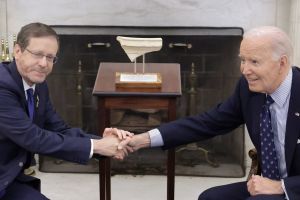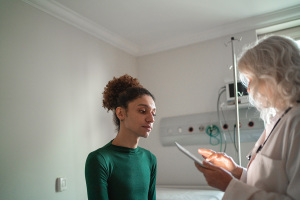Netflix documentary highlights fertility doctor who used own sperm to impregnate at least 50 women

A new Netflix documentary follows the story of an Indianapolis-based fertility doctor who secretly impregnated at least 50 women with his own sperm in the 1970s and 1980s.
The new documentary, "Our Father," expands on the investigation of Dr. Donald Cline, whose actions were also the subject of a 2019 article in The Atlantic.
The documentary features interviews with the genetic siblings the fertility doctor created by swapping their intended father’s sperm with his own. Dr. Cline was eventually exposed after these siblings found one another on websites like ancestry.com, a resource that helps people gain insights about their family through their DNA.
"Jacoba Ballard was conceived through a sperm donor using artificial insemination. Growing up as an only child, she dreamed of having siblings. After using an at-home DNA test, Ballard discovered that she had not one but seven half-siblings," the documentary's synopsis reads.
"Unfortunately, this isn’t a story about one happy family reunion. As the group of siblings set out to learn more about their curious family tree, they uncovered a sickening truth: Their parents’ fertility doctor had been inseminating his patients with his own sperm — without their consent."
The documentary will be released on the streaming platform on May 11.
Jennifer Lahl, president of the Center for Bioethics and Culture Network, told The Chrisitan Post that cases like the one involving Dr. Cline are not uncommon within the fertility industry. Lahl is also the director and producer of the 2010 "Eggsploitation" documentary, which examined some of the industry’s abusive practices.
“Well, I think because I've been at this for so long, my gut reaction is that this is a Netflix movie based on the many stories of reality where this happens,” she said. “This isn't the first case where a doctor has been found out.”
Lahl cited the case of Norman Barwin, a fertility doctor who allegedly used the wrong sperm and even his own in the conception of at least 100 children. According to the American Council On Science And Health, a class-action lawsuit against the doctor resulted in a $10 million settlement last July.
“So, yeah, it's more common than we'd like to know,” she said.
But sperm donation itself, Lahl noted, already forces children to contemplate how they were conceived and the existence of multiple genetic family members, which was the topic of Lahl’s 2011 documentary, “Anonymous Father’s Day.”
“One of the gentlemen in my film … his name is Barry Stevens, and his sperm donor was a man,” she said. “And his wife was one of the biggest fertility doctors in the United Kingdom. So she routinely used her husband's sperm for three decades. And so, Barry Stevens estimates that he's got probably a thousand plus half-siblings because this man for three decades is donating his sperm to one of the busiest fertility doctors in the United Kingdom.”
While Lahl would rather see the practice of sperm donation “go away,” she said stopping men from receiving money for donating sperm, removing anonymity and limiting how many times a person can donate could help regulate the practice.
“When you think about it, that's trying to get at the best interests of the child,” she said. “So it's not to put the brakes on big fertility if you will. It really is trying to address what's in the best interests of the child, which I would still argue that's not the best interest of the child to be created by donor sperm.”
According to the International Fertility Law Group, sperm donation in the United States is one of the "least regulated" reproductive technologies.
Almost all sperm donors receive compensation, and some donors potentially father "dozens or even hundreds of half-siblings." There is also reportedly no legal enforcement of The American Society of Reproductive Medicine’s guidelines, which call for limiting each donor to 25 live births.
The ASRM also recommends recording and preserving donor information, but this is not enforced by law either. The regulations surrounding sperm donation vary in each state.
Donors are typically young and in need of money, and the promise of anonymity and financial compensation often persuades them to donate their sperm. While some only receive $25 for a donation, parents who know the sperm donor's identity may agree to pay more for contributing to the conception of a child.
In comparison, Austria, the United Kingdom, Sweden and New Zealand require sperm donors to provide medical and identifying information and consent to a contract with their future offspring. As STAT reported, countries where anonymous sperm donation is no longer legal often experience supply shortages due to a decline in sperm donors.
A 2016 study published in the Journal of Law and the Biosciences reported about 29% of potential donors said they would refuse to donate if their names were recorded on a registry. The study suggested that a decline in sperm donations is linked to a lack of anonymity, but donors willing to be identified are likely to demand more compensation.




























